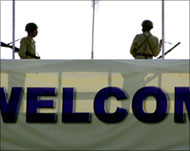Indian PM arrives in Islamabad
Indian Prime Minister Atal Behari Vajpayee arrived in Islamabad on Saturday on his first visit to Pakistan for four years.

Vajpayee flew in to the heavily-guarded airport on a private flight from New Delhi to attend a landmark seven-nation summit of South Asian countries, which starts on Sunday.
Before leaving for Islamabad, Vajpayee had ruled out formal bilateral talks with Pakistan at the summit.
“In Islamabad, there will be no bilateral talks. We want to give all our energy to making the SAARC (South Asian Association Regional Cooperation) talks successful,” Vajpayee told India’s state-run television Doordarshan before his departure.
The prime ministers of Nepal and Bhutan flew into Islamabad on Saturday morning, the first of six visiting heads of government to arrive for the 18-year old forum’s 12th summit.
Meanwhile, Pakistan Prime Minister Zafarullah Jamali said he expected “a structured Indo-Pak summit”.
“There is a possibility that I will have a separate meeting with my Indian counterpart, as the two countries have moved from a dead-end to silver-lining,” Jamali told The News daily in an interview published on Saturday.
|
“Ice has been broken with the recent spate of confidence-building measures initiated by Pakistan and India” Zafarullah Jamali, |
“Ice has been broken with the recent spate of confidence-building measures initiated by Pakistan and India,” the prime minister said.
The South Asian Association for Regional Cooperation (SAARC) groups Bangladesh, Bhutan, India, the Maldives, Nepal, Pakistan and Sri Lanka.
“At the end of the first day, I have no hesitation in saying that the Islamabad summit is going to be an exceptionally successful and historic SAARC summit,” Indian Foreign Minister Yashwant Sinha said after foreign ministers concluded the first of two-day pre-summit talks late on Friday.
Coming 10 days after a double assassination attempt against Pakistan President Parvez Musharraf – the second in less than a fortnight – a massive security net has been thrown around Islamabad for the summit.
Some 10,000 police and paramilitaries are being deployed around the city, roadblocks have been erected at city entries and most intersections to check cars and passers by for bombs.
Soldiers and anti-aircraft guns have been posted in hills overlooking the city and army helicopters buzzed low overhead.
“A complete security blanket has enveloped Islamabad,” Interior Minister Faisal Saleh Hayat told reporters ahead of the summit.
Trade deal
 |
|
Heavy security surrounds the |
Foreign ministers from the seven countries agreed on Friday to create a regional free trade area, a deal that India said would help improve ties with Pakistan.
As that meeting opened, India and Pakistan’s foreign ministers greeted each other with a warm embrace in what was their first meeting since the middle of 2002.
The South Asia Free Trade Agreement (SAFTA) paves the way for a free trade in the region where one fifth of the world’s population and almost half its poor live.
With 1.4 billion consumers, business leaders believe the region has the potential to develop into a powerful trade bloc. They hope it will raise inter-SAARC trade from four or five percent of their total trade output to 60 %.
Hopes were also high that it would help mend ties between India and Pakistan.
“Ultimately regional cooperation gets translated into bilateral
cooperation,” Sinha said.
“If there is free trade in the region, it won’t be free trade minus India and Pakistan. So it rubs in this manner.”